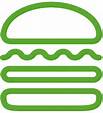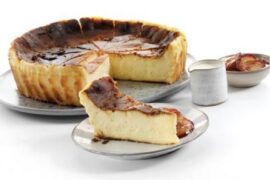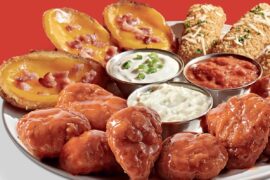With thanks and a nod of appreciation to the Temptations for taking a bit of lyrical license from a page of their 1970’s songbook: Let us tell you about a place we know – to get in on the ground floor it will take a little dough. Shake Shack, that’s where it’s at.
On December 28, the New York-headquartered upscale burger chain doing business as Shake Shack Inc. filed documents with the US Securities and Exchange Commission (SEC) in declaring its intention to raise big bucks [reportedly up to $100 million] for expansion via an initial public offering (IPO) of Class A common stock.
The company, which bills itself as a “modern day roadside burger stand,” is gearing up to take to the highway full-speed ahead in all directions.
“We will continue to not only fill in existing markets such as New York, Boston, Philadelphia, Washington, DC, Atlanta, Chicago and South Florida to leverage operational effectiveness as we cluster in high-density markets, but also enter new markets, such as Austin, where we have signed leases,” stated Shake Shack in the SEC filing.
“We open Shacks in areas where communities gather, often with high foot traffic and substantial commercial density such as New York City’s Theater District, London’s Covent Garden and Dubai’s Mall of the Emirates,” it elaborated.
According to the prospectus, the company’s Manhattan restaurants (seven of 16 in the Greater New York area) generated average sales of $7.4 million in 2013, which amounts to nearly double the receipts rung up at “non-Manhattan Shacks.”
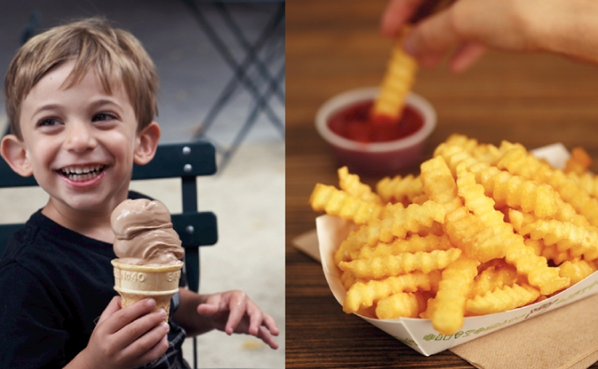
In addition to Angus beef burger specialties, the restaurant features vegetarian ’shroom (as in mushroom) burgers, flat-top hot dogs, frozen custard, crinkle-cut fries, milk shakes, craft beer and wine. Menu prices range from $3 for a Vienna all-beef hot dog, to $3.90 for an order of cheese fries, $4.95 for a ShackBurger topped with cheese, lettuce, tomatoes and sauce, and $8.50 for a glass of Napa Valley vintage Shack red wine.
Chairman and founder Danny Meyer, who started the business in 2001 working from a solo hot dog cart in Manhattan’s Madison Square Park, aims to expand Shake Shack’s presence to 450 outlets worldwide. The company currently operates 36 units in the US and 25 overseas in the United Kingdom, Turkey, Russia, Lebanon, Kuwait, Saudi Arabia and the United Arab Emirates.
Frozen Fry Lesson Learned
Interestingly, while the chain has attracted a devoted following in no small part by playing up non-frozen ingredients, its attempt to switch from frozen crinkle-cuts to hand-cut fries prepared on the premises of each outlet proved unsuccessful.
“About a year ago, we decided to convert our classic crinkle-cut fry to a fresh, hand-cut, Russet potato [fry]…We set out to do what we thought was best and what we believed our guests wanted,” Randy Garutti, chief executive officer and director of Shake Shack, wrote in a open letter to customers dated August 8, 2014. “We learned quickly that sourcing the best potatoes, cutting thousands of them by hand, soaking and double-frying wasn’t easy. But that didn’t stop us. We converted kitchens, added and retrained team members, and successfully launched our hand-cut fries.”
However, real success in the restaurant business can only be measured by customer satisfaction. And it’s a sure bet that lovers of fries insist on crisp, hot, tasty servings of their favorite potato side dish on a consistent basis. The reality is that consistency in volume is difficult to deliver manually day-in and day-out during peak hours of feeding frenzy. This is the reason why high quality, reliable frozen french fries from specialist suppliers of value-added spuds are preferred by foodservice operators around the world.
Well-intentioned Shake Shack learned this lesson the democratic way, as consumers and staff alike voted by turning thumbs down to results of the fresh-cut, in-house experiment.
“We weren’t satisfied, and neither were the overwhelming majority of our fans,” confessed Garutti. “No matter how hard we tried, inconsistency remained and we found ourselves unable, 100% of the time, to deliver what our guests loved most about our crinkle cuts…”
“Now with the benefit of hindsight,” he continued, “ it’s clear that we underestimated the love for our classic crinkle-cut fry. We reacted to what we thought we heard. But in fact, while listening to a few outspoken critics, we never fully heard the legions of fans that loved our classic crinkle.”
The message from the masses was received loud and clear.
“Even fans that genuinely appreciated what we were trying to do continued to remind us that they just wanted the crinkle-cuts back,” said Garutti. “It’s humbling to know that so many people care so deeply about our menu… With that, we’re thrilled to announce that in November, Crinkle will be back!”
So it came to pass. Along the way, the company garnered plenty of positive publicity leading up to the IPO filing. The lengthy document, incidentally, is good reading not only for investors in particular, but also for those interested in the foodservice business in general.
Overseas Logistics Challenges
Following an anticipated infusion of cash from the expected sale of stock shares, the company will seek to significantly boost its presence both at home and abroad. As such, the subject of supply chain logistics was detailed in papers filed with the SEC.
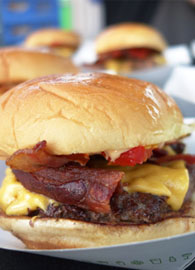 “International licensed Shacks import most of our proprietary ingredients from the United States and the European Union,” stated the prospectus. “For example, our proprietary blend of beef patties and/or raw materials for beef patties originate from the United States and the EU as well as Australia. In addition, our potato buns are exclusively [sourced] from the United States, and other key items such as crinkle-cut fries and American cheese originate within the United States or the EU. While we have established secondary supply solutions for some of these ingredients, we have not acquired secondary supplies for all of them.”
“International licensed Shacks import most of our proprietary ingredients from the United States and the European Union,” stated the prospectus. “For example, our proprietary blend of beef patties and/or raw materials for beef patties originate from the United States and the EU as well as Australia. In addition, our potato buns are exclusively [sourced] from the United States, and other key items such as crinkle-cut fries and American cheese originate within the United States or the EU. While we have established secondary supply solutions for some of these ingredients, we have not acquired secondary supplies for all of them.”
Due to the long lead time requirements and general volatility in the supply chain, third party logistics providers in the Middle East carry one to three months of inventory to allow for delays or interruptions in the supply chain. Shake Shack has experienced past and ongoing issues in ensuring that timely and adequate supplies reach its units as needed in that part of the planet.
“In the Middle East, our licensee, Alshaya Trading Company W.L.L., delegates the supply function to its third party logistics providers in each country in which Alshaya operates, with which we have limited and restricted communication, preventing us from exercising control or instruction over such entities,” according to the prospectus. “As a result [it] has a limited ability to achieve economies of scale and minimize production and freight costs.”
As for the Russian Federation, sanctions implemented by the Moscow government on many imported ingredients from the United States, the EU and Australia have affected the ability of the Shake Shack licensee there to import ingredients.
“As a result of the changing and uncertain nature of such sanctions, while our licensee in Russia has identified a back-up supplier, we are unable to guarantee that the licensee will be able to import our proprietary ingredients to supply this Shack,” stated the prospectus. “We have given our licensee in Russia approval to utilize alternative ingredients not affected by the sanctions, but there is a risk that these substitute ingredients may be inferior in taste and quality or come from suppliers that have not been vetted for food safety and quality assurance.”
In the United Kingdom, Shake Shack faces challenges in obtaining potato buns and custard, which originate from US suppliers. While these ingredients have no trade restrictions, there is an ongoing risk of delay in supply deliveries.
“Our Turkish Shacks currently import many key ingredients from both the EU and the United States,” noted the prospectus. “As is common in many developing markets, regulations are always subject to change which could potentially give rise to import risks should current importation legislation change. We are currently working on local Turkish alternatives to alleviate these risks in the future.”
The company has a limited number of suppliers for its major products, including beef patties, potato buns, custard, Portobello mushrooms and cheese sauce. In 2013 it purchased all ground beef patties from two suppliers, with more than 87% produced by one supplier. Potato buns came directly from one exclusive supplier, as did custard base. ’Shroom burgers and ShackSauce were sourced from two suppliers.
Sales and Profits Picture
Shake Shack, which has opened 18 new company-operated restaurant since 2012, saw net profits increase by 31.2% to $5.4 million in 2013 as revenues advanced 41.4%. Same-store sales grew by 5.9% during the same period.
On a negative note, profits reportedly have declined by 20% to $3.5 million during the nine-month period that ended on September 20, 2014. However, receipts rose 39% during the same timeframe in comparison with previous year figures. Same-store sales were up 3%, compared with 5.5% in 2013. – Reported by John Saulnier

